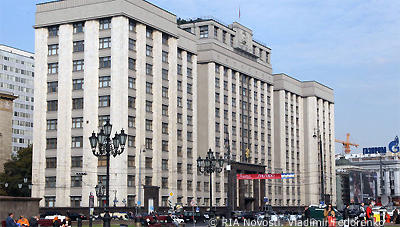Russian Duma Approves Restrictions On Foreign Media

(Article ©2017 RFE/RL, Inc., Radio Free Europe/Radio Liberty – rferl.org – November 15, 2017- also appeared at rferl.org/a/russia-amnesty-foreign-media-bill-repressive/28854885.html)
The lower house of Russia’s parliament has unanimously approved legislation that would authorize the government to designate media outlets receiving funding from abroad as “foreign agents.”
The State Duma approved the amendments — which Amnesty International said would deal a “serious blow” to media freedom in Russia — in the third and final reading on November 15.
Before the crucial second reading a few hours earlier, Duma speaker Vyacheslav Volodin described the bill to deputies as a “symmetrical response” to what he said was U.S. pressure against Russian journalists.
But Radio Free Europe/Radio Liberty (RFE/RL), one of the media outlets that Russian officials have warned could be labeled a foreign agent, said that even before the Duma’s action the situations faced by U.S. media in Russia and Russian media in the United States were “vastly unequal.”
Deputy Duma speaker Pyotr Tolstoi said immediately before the second-reading vote that the legislation — which now goes to the upper parliament house and then to President Vladimir Putin — “will in no way affect freedom of speech in Russia.”
But Amnesty International said the authorities will “tighten their stranglehold” if they approve the measure, worsening “what was already a fairly desperate situation for press freedom in Russia.”
Federation Council head Valentina Matviyenko said on November 14 that the upper chamber will consider the measure at its next session, set for November 22.
Kremlin spokesman Dmitry Peskov on November 15 refused to say whether Putin would sign the measure, but he added that the bill gives Moscow the ability to respond to any “restrictions to the freedom of Russian media abroad.”
Garri Minkh, the presidential administration’s representative at the Duma, told state-run news agency TASS that Putin’s administration “supports” the Duma bill.
‘U.S. Pressure’
In the second reading, the bill passed with 409 of 450 deputies voting in favor, with no objections and no official abstentions. No deputy spoke out in opposition to the proposed legislation, which lawmakers and officials have said is likely to affect international media outlets such as RFE/RL, Voice of America, CNN, and German public broadcaster Deutsche Welle.
Articles and broadcasts by registered media must be accompanied by a disclaimer informing audiences of the outlet’s status as a “foreign agent.” It is unclear if the Justice Ministry will be able to shut down foreign-funded media outlets that refuse to register themselves as foreign agents.
Moscow alleges that the state-funded Russian media outlets RT and Sputnik have come under increasing pressure in the United States in the past year and has vowed to respond by targeting U.S. media in Russia.
On November 13, RT television registered with the U.S. Justice Department under the Foreign Agents Registration Act (FARA).
A U.S. intelligence finding in January asserted that RT and Sputnik spread disinformation as part of a Russian-government effort to influence the 2016 U.S. presidential election. Moscow has denied any such effort.
In a November 15 statement, RFE/RL said that the “situation regarding Russian media in the U.S. and U.S. media in Russia remains vastly unequal.”
“RT and Sputnik distribute freely in the U.S., whereas RFE/RL has lost its broadcast affiliates in Russia due to administrative pressures, and has no access to cable,” it said. “RFE/RL reporters are subject to harassment and even physical attack in Russia.”
“RFE/RL’s job is to provide accurate and objective journalism to our Russian-speaking audiences worldwide, including in Russia,” the statement concluded. “We look forward to continuing our work.”
The Duma also approved amendments to the mass-media law that would allow the extrajudicial blocking of websites that the Russian government deemed “undesirable.”
Currently, 11 international nonprofit organizations have been declared “undesirable” in Russia, but none of their websites has been blocked.
‘Onerous Obligations’
In its statement on November 15, London-based Amnesty said that the bill would impose “onerous obligations to declare full details of their funding, finances, and staffing.”
Independent media outlets and journalists in Russia face “reprisals and risk attacks on an almost daily basis,” said Denis Krivosheyev, deputy director for Europe and Central Asia at Amnesty. He added that many of them have been “forced out of the mainstream Russian media space.”
“This latest legislation takes obstacles for media working in Russia to a whole new level,” Krivosheyev said.
Deputy speaker Tolstoi said on November 14 that foreign-funded news organizations that refused to register as foreign agents under the proposed legislation would be barred from operating in the country.
Mikhail Fedotov, head of the presidential human rights council and an author of Russia’s original mass-media law, told the RBK news agency that the amendments were “incorrect.” He said there was no need to amend the mass-media law and any “symmetrical response” should be implemented by the executive branch.
Former Finance Minister Aleksei Kudrin wrote on Twitter that he agreed with Fedotov. “The amendments on giving foreign-agent status are being adopted hastily and are badly thought out,” he wrote.
U.S. officials say that the existing Russian law regarding foreign agents differs from FARA, which was passed in 1938 to counter fears of Nazi propaganda and disinformation being spread in the United States.
State Department spokeswoman Heather Nauert said last month that the need for registration under FARA “is simply triggered when an entity or an individual engages in political activity.”
The developments come as ties between the United States and Russia continue to be severely strained over issues including Moscow’s alleged interference in the U.S. presidential election last year and its military intervention in Ukraine.
Russian Prime Minister Dmitry Medvedev said on November 14 that “our relations are degrading day by day” and “have reached the lowest point in recent decades.”
With reporting by Meduza and TASS
